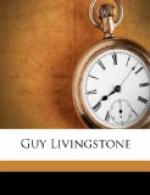There was threatening of foul weather to windward. The clouds, in masses of indigo just edged with copper, were banking up fast, and the “white horses,” more and more frequent, were beginning to toss their manes against the dark sky-line.
To the few travelers whom the stern necessities of business drove forth, lingering and shivering, from their comfortable inns on to the deck, already wet and unsteady, Livingstone was an object of great interest and many theories. His impatience to be gone was so marked that the conscientious official looked more than once suspiciously at his passport.
Mr. Phineas Hackett, of Boston, U.S., Marchand (so self-described in the Livre des Voyageurs at Chamounix), made up his mind that he saw before him the hero of some gigantic forgery, or a fraudulent bankrupt on a large scale; but, just as he had fixed on the astute question which was to drive the first wedge into the mystery, Guy turned in his quick walk and met him full. I doubt if he even saw the smooth-shaven, eager face at his elbow; but he was thinking again of the lost letter, and the savage glare in his eyes made the heart of the “earnest inquirer” quiver under his black satin waistcoat. “D——d hard knot, that,” he muttered, disconsolately, and retreated with great loss, to writhe during the rest of the passage in an orgasm of unsatisfied curiosity.
The weather looked worse every moment as the wild north wind came roaring from seaward with a challenge to the vessels that lay tossing within the jetty to come forth and meet him. The waste-pipe of the Sea-gull screamed out shrilly in answer; and the brave old ship, shaking the foam from her bows after every plunge, as her namesake might do from its breast-feathers, steamed out right in the teeth of the gale.
A regular “Channel night”—a night which Mr. Augustus Winder, Paris traveler to H—— and Co., the mighty mercers of Regent Street, spoke of in after days with a shudder of reminiscence mingling with the pride of one who has endured and survived great peril; who has gone down to the sea in ships, and seen the wonders of the deep. His associates—the elite of the silk-and-ribbon department—youths of polished manners and fascinating address, than whom non alii leviore saltu took the counter in their stride—would gather round the narrator in respectful admiration, just as the young sea-dogs of Nantucket might listen to a veteran hunter of the sperm whale as he tells of a hurricane that caught him in the strait between the Land of Fire and terrible Cape Horn.
Mr. Winder represented himself as having assisted all on board, from the captain down to the cabin-boy, with his counsel and encouragement, and as having been materially useful to the man at the wheel. The fact was, that he cried a good deal during the night, and was incessant in his appeals to the steward and Heaven for help. In his appeals to the latter power he employed often a strangely modified form of the Apostles’ Creed; for his religious education had been neglected, and this was his solitary and simple idea of an orison. However, no one was present to detract from his triumph or to controvert his concluding words:




